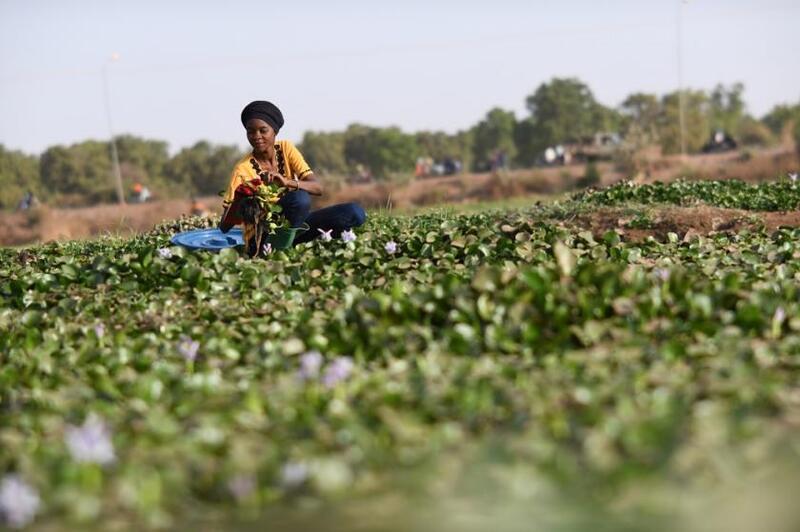
$50bn SDG-targeted investment proposals at SDG Investment Fair
Over 100 SDG-aligned projects with a total investment scope of $ 50 billion have been presented during the ...

Mariama Mamane, the founder and general manager of Jacigreen, said her foundation seeks to reach 500 households with biogas and more than a thousand farmers with organic fertilizer by 2021.
The pilot Jacigreen tackles the problem of invasive water hyacinth plants chocking Burkina Faso’s water supply. The invention of the 29-year-old environmental engineer cuts up water hyacinth, fermenting into a fertilizer and compost for farmers, called Jacigrow—available in bottles of 250 ml, 0.5 litres, 1 litre and 5 litres.
The by-product of the fertilizer is a gas, which Mamane’s machine captures in blue plastic square bags, like the one she is trying to attach to the generator now, and converted into electricity for families who don’t have a regular power supply.
Mamane’s fertilizer and biogas prototype is now complete. Now, she is working with families and farmers surrounding the International Institute for Water and Environmental Engineering (2iE), where her biogas prototype is located, to test the fertilizer and biogas.
“Our aim is to provide solutions for families who do not have access to electricity and are using wood,” she explains. “Biogas can reduce deforestation and the encroachment of the desert into communities.
“We also aim to reach the maximum number of farmers to reduce chemical fertilizer use, building a resilient ecosystem and healthier products for consumers,” she says.
By 2021, her vision is to reach 500 households with biogas and more than a thousand farmers with fertilizer. She is no stranger to determination—it has got her where she is today. “When I won the Young Champions of the Earth prize for Africa, I faced so many challenges in building my prototype during this entrepreneurial adventure,” she explains.
“Transforming my idea into a concrete solution required lot of research. I ordered equipment from China and Germany because it isn’t available locally. I found myself doing everything—from masonry to plumbing—to build this prototype. But the prize gave me courage, and this has been an unforgettable learning experience.”
“It is important to persevere when something seems impossible. Pushing through these times helps you grow and gives you energy in your professional life. I encourage other girls and young women to push beyond their dreams, and they will achieve,” she adds.
Mariama quickly envisioned what impact her prototype might have on society in rural areas, explaining that the value of biogas lies in its application in regions without electricity, and that the fertilizers reduce waste and boost agricultural production on small plots.
Water hyacinth is one of the world’s most invasive, resilient and harmful aquatic weeds. Joakim Harlin, Chief of UN Environment’s Freshwater Unit, says that combating infestations is very difficult and requires a freshwater ecosystems approach, addressing land and water management to reduce the nutrient which feeds the weed.
“Utilization of water hyacinth for commercial and subsistence purposes like the initiative Mariama has taken not only helps controlling the weed and protecting the environment but also converts a problem to a livelihood opportunity,” he notes.
Mariama said “To solve the problems the planet is facing, we must solve them through more commitment, more actions, and for that we must act now.”
“My solution is to turn this problem into an opportunity for the Population. I turn water hyacinth into energy of all. This plant became invasive. We will use the plant in a process to produce organic fertilizers and electricity from biogas.”
“Our solution, the biological fertilizer, will boost agricultural production and thus, require less space for a bigger production.”
“Today, from this pilot we are able to cover the needs of more than twelve households and more than one hundred farmers will be able to use our fertilizers.”
“When I received the United Nations Environment Young Champions of the Earth Award in 2017, I had the courage to truly implement these solutions. This prize gave me the global visibility and allowed me today to finance my pilot phase.”
“My aim is to inspire other young women like me to fight for the future. I want to work and solve the big challenges of tomorrow, ” she concluded.
Over 100 SDG-aligned projects with a total investment scope of $ 50 billion have been presented during the ...
Global electric car sales are set to hit around 17 million by the end of ...
Ericsson Canada marked the Earth Day by joining the Environment and Climate Change Canada’s (ECCC) Net-Zero ...


اترك تعليقا